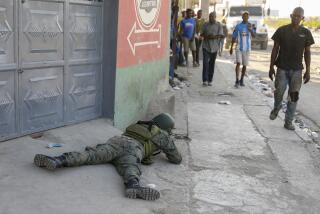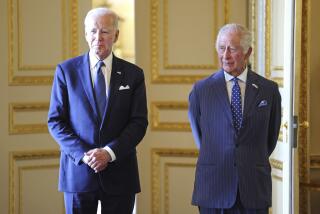U.S. Stalled by British-French Rift on Strategy
- Share via
WASHINGTON — The Clinton Administration said Monday that it is willing to send U.S. helicopters and ground crews to bolster U.N. forces in Bosnia-Herzegovina but that it will not formally commit itself until the allies settle their differences over how aggressive a stance to take there.
After a meeting of President Clinton and his top foreign policy advisers, senior Administration officials bluntly warned Britain and France that they must come up with a viable Bosnia plan on which all sides agree--or not count on Washington to provide needed logistic support.
The Administration’s continuing caution is designed to intensify pressure on London and Paris. A London meeting of top military officials from all three countries Sunday showed the two allies sharply divided over what action to take.
They have scheduled a second meeting--this one of foreign ministers and defense ministers--for Friday. And while U.S. officials plan to attend, the White House, in effect, suggested that the session should be canceled if Britain and France remain split.
Richard C. Holbrooke, assistant secretary of state for European affairs, described the split succinctly: The French, he said, are convinced that “safe areas,” such as Gorazde, can be defended, and “want us to help them. The British aren’t quite sure.”
Senior White House policy-makers cautioned that the situation still is uncertain and that the Administration has not made any decisions on whether to provide attack helicopters or logistic support for an allied effort to defend Gorazde.
Officials said it still is unclear whether U.S. pilots ultimately would be deployed to fly the helicopters, whether American ground crews would be involved or even how long such a mission might last.
Administration political strategists, struggling with the issue of sending U.S. helicopter pilots and ground crews to support a British and French attack against the Bosnian Serbs, are troubled because they fear the action could make it seem that Clinton is backing away from his pledge not to send ground troops to Bosnia.
“There is absolutely no question that that type of [helicopter] operation would involve risk and most likely casualties,” White House Press Secretary Mike McCurry conceded. But he insisted that “when we think of ground troops, we think of infantry deployments--and that’s a different issue.”
McCurry said Clinton does not intend to seek Congress’ approval if he decides to send U.S. helicopters and ground crews to the region, on grounds that the chopper crews are “noncombatants” and no approval is required.
But Republican congressional strategists warned that if Clinton does not seek lawmakers’ approval, they might push through legislation prohibiting him from using federal funds to finance anything but a full-scale withdrawal of U.N. peacekeeping forces.
Congress and the White House already seem on a collision course over a proposal that the Senate plans to consider next week. It would end U.S. participation in the U.N.-imposed Balkans arms embargo. Critics say the embargo hurts the generally less well-armed Bosnian Muslims while aiding the Bosnian Serbs, who have ample heavy weaponry that once belonged to the Yugoslav army.
The resolution, drafted by Senate Majority Leader Bob Dole (R-Kan.), is expected to pass easily. Congressional strategists say the only question will be whether GOP leaders can win a large enough majority to override a presidential veto, if Clinton chooses to reject the plan.
Clinton and a bevy of senior Administration officials have warned that lifting the embargo would prompt the allies to withdraw U.N. peacekeeping forces entirely, allowing the Bosnian Serbs to overrun the Bosnian government forces and risking the spread of fighting to other areas.
In a significant indication that support for the measure is mounting, Sen. Dianne Feinstein (D-Calif.) said that she may support Dole’s resolution. Feinstein said she had opposed the Dole plan before but has been deeply affected by recent television images from Bosnia.
Analysts said Monday that the British-French split over how aggressive a stance to take in Bosnia has heightened the risk that Gorazde will fall because the allies would be unlikely to be able to muster their defense force around the city before the Bosnian Serbs can attack it.
The split between Britain and France apparently came to a head at the meeting of allied military leaders Sunday. According to reports, France proposed assembling a force of 1,000 combat troops to protect Gorazde from rebel Serb attack but that Britain declared the force too small to do the job.
U.S. Gen. John M. Shalikashvili, chairman of the Joint Chiefs of Staff, briefed the President’s top foreign policy advisers Monday at a two-hour meeting in which Clinton made a late appearance. Officials said the President wants the allies to agree on one plan.
Holbrooke also disclosed that the Administration has served notice that it will not send any U.S. forces to Bosnia--even as “noncombatants”--unless the allies scrap the “dual-key” approach that requires U.N. permission for any military action.
The Administration is supporting the allied effort to beef up U.N. peacekeeping forces in Bosnia in a last-ditch effort to stave off a full-scale withdrawal of all U.N. troops, which the French have threatened to begin if the allies do not help provide adequate protection.
Times staff writer Michael Ross in Washington contributed to this report.
More to Read
Sign up for Essential California
The most important California stories and recommendations in your inbox every morning.
You may occasionally receive promotional content from the Los Angeles Times.














